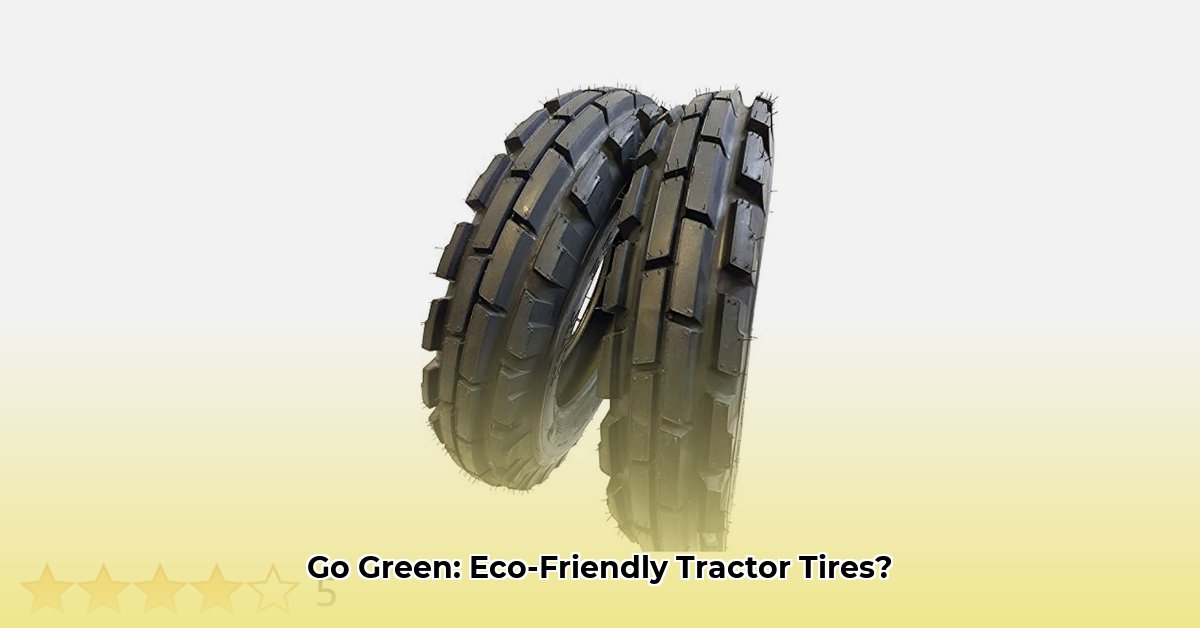
Carlisle Farm Specialist F-2 6.50-16: A Detailed Review
The Carlisle Farm Specialist F-2 6.50-16 tractor tire presents itself as a potential solution for farmers seeking improved performance and environmental sustainability. This review analyzes its features, performance, and economic viability, while acknowledging limitations in available data concerning its full lifecycle environmental impact. For more information on other 6.50-16 tires, check out this helpful resource: Tire Size Guide.
Tire Features and Intended Applications
The Carlisle Farm Specialist F-2 boasts a self-cleaning, three-rib tread design. This design aims to minimize soil compaction and maximize traction across various terrains. The tire is explicitly designed for agricultural and light construction applications where durability and grip are critical.
Performance Analysis: Traction, Lifespan, and Soil Compaction
While the tire's design suggests reduced soil compaction and improved traction, concrete data supporting these claims remains limited. Independent, peer-reviewed studies comparing the F-2's performance to competitors are needed to fully assess its effectiveness. Currently, available information is primarily based on manufacturer specifications and early user feedback. We need rigorous testing over extended periods to determine its true lifespan and quantify its impact on fuel efficiency. This would help determine if the initial investment is recouped through extended tire life and reduced fuel consumption.
Is this tire genuinely superior in terms of soil compaction compared to other 6.50-16 tires? Quantifiable data from independent studies is urgently needed to answer that question.
Sustainability Assessment: A Partial Picture
Assessing the F-2’s complete environmental impact requires a comprehensive life cycle assessment (LCA). However, data on manufacturing processes, material sourcing, and end-of-life management is currently unavailable, limiting a fully informed sustainability analysis. The tire’s self-cleaning tread is a positive aspect, potentially reducing soil disturbance; however, this alone is insufficient for a holistic environmental evaluation.
What percentage of the tire’s components are currently recyclable? Understanding the recyclability rate is crucial for a comprehensive sustainability assessment, and this information needs to be provided by the manufacturer.
Economic Analysis: Cost-Benefit Considerations
The initial purchase price of the Carlisle Farm Specialist F-2 needs to be weighed against its projected lifespan and potential fuel savings. A detailed cost-benefit analysis comparing this tire's total cost of ownership (TCO) to competitors is vital for farmers. This analysis should factor in the purchase price, fuel efficiency gains (if any), potential maintenance costs, and the expected duration before replacement.
Can the claimed longevity of the F-2 translate to real cost savings for the farmer? Only a comprehensive economic analysis, including data on fuel consumption, maintenance, and lifespan, can definitively answer this.
Actionable Recommendations: Steps for Stakeholders
1. Farmers: Maintain accurate records of fuel consumption, tire lifespan, and soil compaction levels (using penetrometers, for example). This data is crucial for independent validation of manufacturer claims and informed purchasing decisions.
2. Manufacturers: Publish transparent life cycle assessments (LCAs) detailing the environmental impact of the tire’s entire lifecycle. Specify the percentage of recycled content and the tire's end-of-life recyclability.
3. Policymakers: Incentivize the development and adoption of more sustainable tire materials and manufacturing processes. Develop and implement robust tire recycling programs.
4. Researchers: Conduct comparative studies of different tractor tire models, focusing on soil compaction, fuel efficiency, and whole-life environmental impacts. Publish findings in peer-reviewed journals.
Conclusion: A Promising Tire, Pending Further Data
The Carlisle Farm Specialist F-2 6.50-16 shows promise in terms of its design features intended to improve traction and reduce soil compaction. However, the lack of comprehensive data regarding its lifespan, fuel efficiency, and overall environmental impact prevents a definitive conclusion on its sustainability. Further investigation and transparent data sharing from manufacturers are critical to determine whether this tire truly represents a significant advancement in sustainable agricultural practices. Independent research is paramount to validate claims and provide farmers with the information needed to make well-informed purchasing decisions.